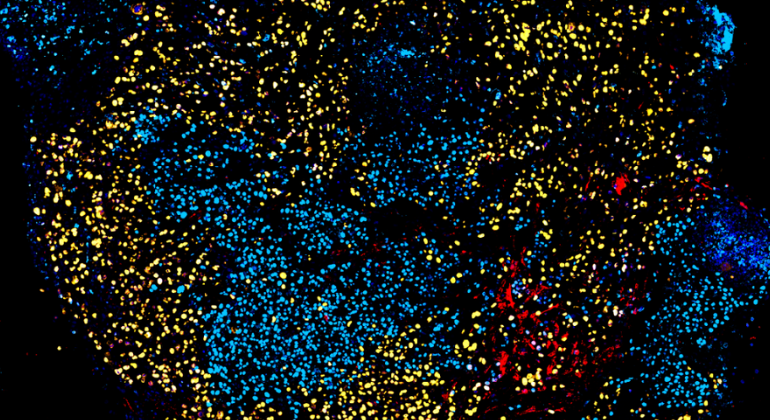Researchers Discover How Immune Cells Resist Radiation Treatment
Researchers at The Tisch Cancer Institute at the Icahn School of Medicine at Mount Sinai have discovered a key mechanism by which radiation treatment (radiotherapy) fails to completely destroy tumors. And, in the journal Nature Immunology, they offer a novel solution to promote successful radiotherapy for the millions of cancer patients who are treated with it.
The team found that when radiotherapy damages skin harboring tumors, special skin immune cells called Langerhans cells are activated. These Langerhans cells can uniquely repair the damage in their own DNA caused by radiotherapy, allowing them to become resistant to radiotherapy and to even trigger an immune response causing skin tumors such as melanoma, to resist further treatment
Investigators mimicked the effect of immunotherapy drugs called “immune checkpoint inhibitors” to boost the immune system to attack tumors. This in turn blocked the ability of Langerhans cells to repair their own DNA after radiotherapy causing them to die, preventing an immune response that protects skin tumors.
“Our study suggests that this combination approach — combining radiotherapy with drugs that rev up a healthy immune response — will help make radiation therapy much more effective,” says the study’s lead author, immunologist Jeremy Price, PhD.
While this study was conducted using mouse models of melanoma and focused on the skin where these Langerhans cells are located, the researchers believe the same process happens in organs throughout the body. There, cousins of Langerhans cells called dendritic cells are also activated by radiotherapy and the investigators stressed that it is critical we understand how they respond to treatment as well.
“Similarly, checkpoint-inhibiting drugs have revolutionized the treatment of melanoma and are being investigated in many other cancers,” said co-author Miriam Merad, MD, PhD, Professor of Tumor Immunology, Oncological Sciences, and Hematology and Medical Oncology at The Tisch Cancer Institute at the Icahn School of Medicine at Mount Sinai. “Cancer has the ability to turn off and even evade the body’s natural immune response to tumors — the new immunotherapy drugs take the brakes off the immune system, promoting a powerful and complete immune response to the cancer.”
“This is synergized by the addition of radiation, which can expose the tumor so it can better be targeted by the immune system,” says Dr. Price. “By combining these treatments, the ability of Langerhans cells to use the immune system to protect cancers will be overwhelmed.”
Ionizing radiation is a powerful therapeutic tool that causes toxic breaks in cellular DNA. The formation of these breaks triggers a response in Langerhans cells (which are usually dormant) to stop further damage and to repair the breaks.
The researchers discovered that when the skin is damaged by ionizing radiation, Langerhans cells travel to nearby lymph nodes to communicate with other immune cells and help program a population of “regulatory” T cells that dampen the immune system. These regulatory T cells then travel back to the damaged tumor, and shield it from attack by the immune system.
“We found melanoma grew much more quickly on mice pretreated with radiation, compared to untreated mice, because of the presence of regulatory T cells activated by Langerhans cells,” Dr. Price says. “These Langerhans cells were resistant to radiation.”
The researchers also discovered that Langerhans cells are able to resist lethal doses of radiation because they express very high levels of an important protein involved in the stress response that orchestrates DNA repair after radiotherapy.
“Any treatment that prevents tumor infiltrating regulatory T cells from being produced, such as immunotherapy, will improve the outcome from radiation treatment — and that will save lives,” Dr. Price added.
The study was supported by grants from the US National Institutes of Health, the American Medical Association, the National Institute of Arthritis, Musculoskeletal and Skin Diseases, and the National Cancer Institute.
About The Tisch Cancer Institute at the Icahn School of Medicine at Mount Sinai
The Tisch Cancer Institute (TCI) is a world-class translational cancer institute established in December 2007. TCI has recruited more than 30 acclaimed physicians and researchers specializing in basic research, clinical research, and population science; built outstanding programs in solid tumor oncology; enhanced existing robust programs in hematological malignancies; and advanced the study of cancer immunology and vaccine therapy. The completion of the Leon and Norma Hess Center for Science and Medicine in 2012 enabled the recruitment of 25 additional cancer researchers on two full research floors, with 48,000 square feet of space dedicated to cancer research. In 2015, TCI was named a National Cancer Institute-designated cancer center. TCI joined an elite group of 69 cancer institutions nationwide that have earned this designation, which is based on scientific excellence, robust clinical research, and beneficial community impact. To learn more about clinical trials at Mount Sinai, visit http://icahn.mssm.edu/research/clinical-trials.
About the Mount Sinai Health System
Mount Sinai Health System is one of the largest academic medical systems in the New York metro area, with 48,000 employees working across seven hospitals, more than 400 outpatient practices, more than 600 research and clinical labs, a school of nursing, and a leading school of medicine and graduate education. Mount Sinai advances health for all people, everywhere, by taking on the most complex health care challenges of our time—discovering and applying new scientific learning and knowledge; developing safer, more effective treatments; educating the next generation of medical leaders and innovators; and supporting local communities by delivering high-quality care to all who need it.
Through the integration of its hospitals, labs, and schools, Mount Sinai offers comprehensive health care solutions from birth through geriatrics, leveraging innovative approaches such as artificial intelligence and informatics while keeping patients’ medical and emotional needs at the center of all treatment. The Health System includes approximately 9,000 primary and specialty care physicians and 10 free-standing joint-venture centers throughout the five boroughs of New York City, Westchester, Long Island, and Florida. Hospitals within the System are consistently ranked by Newsweek’s® “The World’s Best Smart Hospitals, Best in State Hospitals, World Best Hospitals and Best Specialty Hospitals” and by U.S. News & World Report's® “Best Hospitals” and “Best Children’s Hospitals.” The Mount Sinai Hospital is on the U.S. News & World Report® “Best Hospitals” Honor Roll for 2025-2026.
For more information, visit https://www.mountsinai.org or find Mount Sinai on Facebook, Instagram, LinkedIn, X, and YouTube.
Researchers Discover Potential Boost to Immunotherapy
Mar 30, 2020 View All Press Releases

